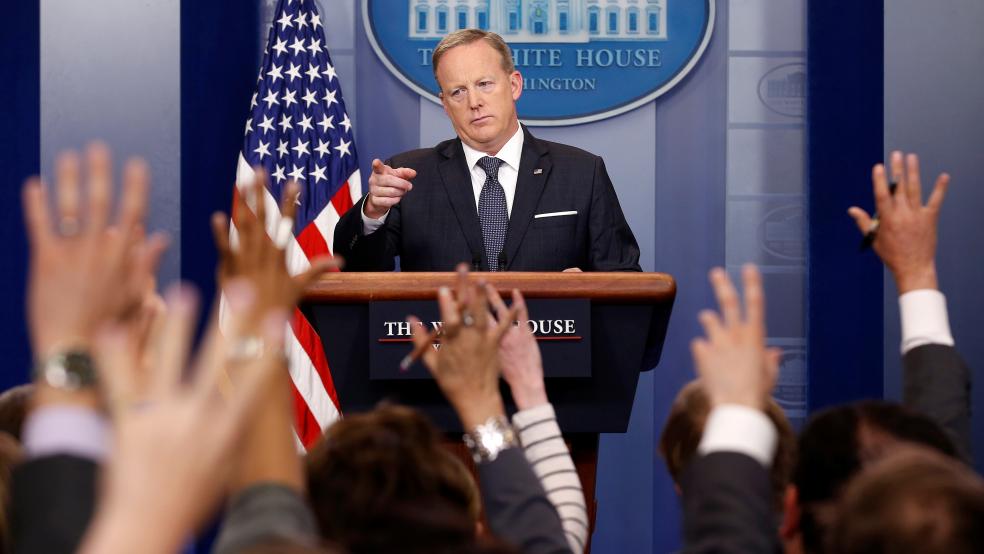Since returning from his first overseas trip last weekend, President Trump has called on Congress to move forward with his key agenda items, particularly the American Health Care Act, which is intended to replace the Affordable Care Act.
One problem with the president’s advocacy, though, is that it’s not clear, even to healthcare experts, what he’s really asking Congress to do.
Related: How the GOP Health Care Disaster Is Opening the Door to Medicaid for All
The House of Representatives passed the AHCA by a razor thin margin on May 4, but had to include so many sweeteners for the GOP conference’s most conservative members that the bill is unlikely to be taken up as written in the Senate, where Majority Leader Mitch McConnell has created a 13-member panel to begin drafting the upper chamber’s own legislation.
Part of the problem for the Senate is that McConnell can only afford to lose two GOP votes, and multiple members of his caucus have expressed serious reservations about a bill that the Congressional Budget Office expects will result in some 23 million fewer Americans with health insurance coverage over the course of 10 years.
Nevertheless, Trump has been pushing Senate Republicans to move forward with the bill -- even if it isn’t obvious how he expects them to do so.
On Monday, Trump tweeted out the following:
I suggest that we add more dollars to Healthcare and make it the best anywhere. ObamaCare is dead - the Republicans will do much better!
— Donald J. Trump (@realDonaldTrump) May 28, 2017
Related: House GOP’s Health Plan Isn’t Much Better the Third Time Around, CBO Says
The "more dollars" reference was cryptic at best. One of the CBO’s criticisms of the bill was that the funding provided to states to ease the burden of potential rate hikes on people with pre-existing conditions was insufficient. Was that what Trump meant? Reporters tried, without success, to get an answer out of White House Press Secretary Sean Spicer on Tuesday.
Q: The President tweeted on Sunday that he thinks Republicans should "add more dollars to healthcare and make it the best anywhere." What did he mean by that?
MR. SPICER: Well, there's a lot of savings that are coming out of the repeal and replace effort right now. I think we're at $119 billion that we saved through the President's efforts. And I think healthcare has been something that the President has been very clear on throughout his time as a candidate, through his presidency, to make sure that the American people get the care and the accessibility that they need. He understands how important healthcare is, and the bottom line is he's going to do whatever it takes to make sure that people have quality, accessible healthcare.
Q: But "add more dollars" -- did he mean to the high-risk pools? Did he mean to the cost-sharing reduction payments? Where did he want to add them?
MR. SPICER: I think this is -- the bill is in progress. Obviously it's in the Senate right now, and he's willing to work with them to do what it takes.
Related: The GOP Is Playing Chicken With Millions of Americans’ Health Insurance
However, Spicer’s reference to the notional $119 billion in savings must have been a clue, because on Wednesday morning, Trump expanded on his call to action.
Hopefully Republican Senators, good people all, can quickly get together and pass a new (repeal & replace) HEALTHCARE bill. Add saved $'s.
— Donald J. Trump (@realDonaldTrump) May 31, 2017
Unfortunately, the “Add saved $’s” suggestions wasn’t especially clear, either.
“Sorry...I don’t know what he means,” one health care analyst emailed after being asked for comment on the president’s tweets.
“I do not know what the President was referring to,” said Matt Fiedler, an Economic Studies fellow in the Brookings Institution’s Center for Health Policy
“These comments are particularly puzzling since the AHCA is built around very deep cuts to programs designed to make coverage affordable, and both the President and the Administration more generally have expressed strong support for the AHCA to date,” he added. “Even more puzzling is the fact that the President’s budget, released just last week, proposed additional cuts to Medicaid on top of those in the AHCA.”
Related: The Question Nobody’s Asking: What If the GOP Can’t Get a Health Law Passed?
Indeed, there’s no way of knowing what “savings” Trump is talking about, much less where he wants to spend it. The CBO’s analysis predicts a $119 billion reduction in costs over 10 years, but the Trump administration’s budget proposal, released last week, promises much more than that.
However, if Trump left people confused, they could take comfort in the fact that they aren’t alone.
Earlier in the week, he urged the Senate to do away with the filibuster on legislation. That would allow Republicans in Congress to muscle bills through the chamber with a bare majority of 51 votes. Democrats would do it if the places were changed, Trump declared, urging GOP senators to make the move so that measures like the health care bill and promised tax reform could enjoy “fast and easy” passage.
The thing Trump appears to have forgotten is that Senate Republicans have, since last year, been telegraphing their plan to use budget reconciliation measured to pass both of those proposals. Reconciliation legislation is immune to the filibuster, so the GOP already needs only 51 votes to get both of those bills through, regardless of the status of the filibuster.





